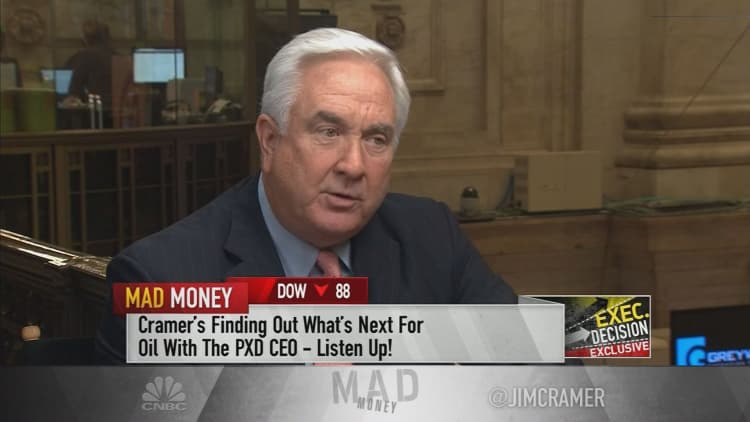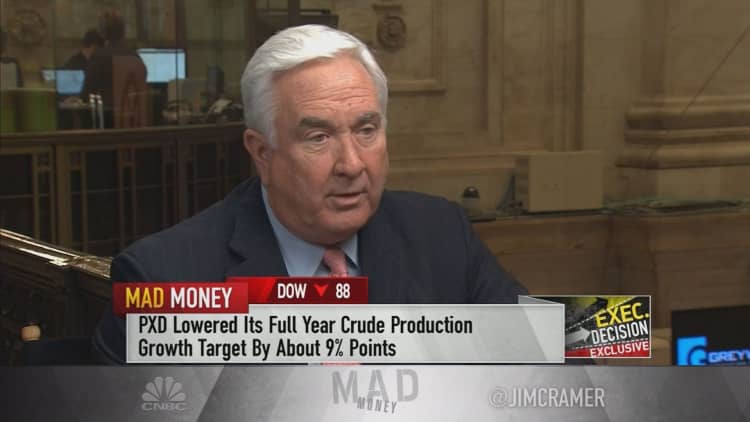
Wall Street traders are all to familiar with oil's recent trajectory — trading in a tight range and struggling to break out above $50 a barrel.
But if oil's 2014 crash was an obstacle for Pioneer Natural Resources chief Timothy Dove, it was hardly enough to eradicate the U.S. oil industry altogether, he told CNBC on Wednesday.
"It's a bit like waking the sleeping giant," Pioneer's president and CEO told "Mad Money" host Jim Cramer. "In other words, challenging U.S. industry to improve in the face of adversity, in this case price adversity, is something that we all stood up to and accepted."
During the crash, oil prices tumbled from over $100 to the $40s in about a year. But rather than letting the fall shutter the oil industry altogether, Dove said it actually spurred innovation.
"We've both been able to have our cost reduced somewhat by our service companies, but at the same time, by our own productivity increases, by our own ingenuity, improving how the wells were drilled and completed and increasing the amount that each oil well produces," Dove said. "And so what happens is our economics are very strong at $45 to $50. Our returns are strong. It's a return-based industry. And so therefore we're drilling wells that make money. And that's going to continue."
And while commodity watchers may have initially balked at the idea of drillers and producers recovering from the crash, Dove told Cramer that his drilling giant has adjusted.
"We thought $45 to $50 was a downturn. Now it's just the status quo three years later," the CEO said.
Still, U.S.-based oil producers have been criticized for being their own worst enemies. For example, when OPEC limits production, U.S. production ticks up, causing many analysts to say that the more oil U.S. players pump, the lower oil prices will go.
In other words, some oil experts think the United States has become a "swing producer," or a seller that tries to keep supply and demand for its commodity in check by deliberately limiting or boosting production.
"If you look at today's current production in the United States ... it's about nine and a half million barrels a day. From all analysis would suggest, it's going to go to something like 10.7 million barrels a day by the end of 2018. So what's happening, of course, [is] we're filling the void. We're filling the gap of demand," Dove told Cramer. "We're also providing a tremendous value to the United States in doing so as well, as it relates to ... the exports and the job creation."
And as U.S. producers inch towards this style of production, companies like Dove's set up hedges in order to make money on every barrel they sell and reduce risk in the case of price collapse.
"If you look at our hedge structure, it's put in place to do two things. One is to give us upside. Our 10-year plan is based on a $55 oil case," Dove explained. "So we protect scenarios where we can get up to $55, but we also protect below $50."
Today, Dove said Pioneer has roughly 60 percent of its oil already hedged for 2018 and 90 percent of it hedged for 2017.
"We're well protected. So if we were to go to a case, let's say the $39 case, which has become somewhat famous, then that means we're going to be achieving more like $45 to $50 because of our hedged position. So it is important to be protective of our spending because we're running, basically, a process organization," the CEO said.
At this point, Dove said that while some of the long-gone bullish calls of $65 to $80 a barrel were difficult to make, Pioneer and its peer companies have learned to adjust to certain price calls.
"We know, as an industry, what we can do. We're showing it. We're going to show it over the next few quarters. We're the principle reason that the oil inventories are shrinking, on the one hand, as a good thing, but our production's coming up on the other," Dove told Cramer. "So I think we'll always be able to meet a price signal, and that said, I think it's the fact that we're going to become ... pretty much one of the swing producers."
Watch Tim Dove's full interview here:

Questions for Cramer?
Call Cramer: 1-800-743-CNBC
Want to take a deep dive into Cramer's world? Hit him up!
Mad Money Twitter - Jim Cramer Twitter - Facebook - Instagram - Vine
Questions, comments, suggestions for the "Mad Money" website? madcap@cnbc.com



